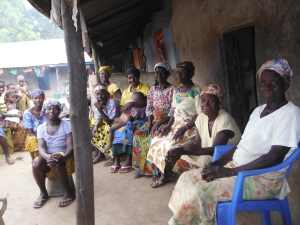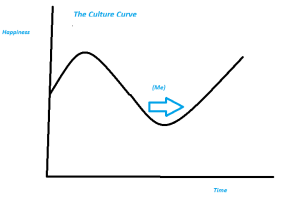Fun fact: Blogging a first post is much more difficult than I thought it would be. Not because I have nothing to say, but because there is already too much I would like to write down. It took me way too long to finally put somewhat of a focus to this upcoming post. So, bear with my jumpy change-in-subjecting!
What is the purpose of this blog?
“So, do you have any plans for the summer?”
“Yes, I do! I am actually going to be working in Ghana through Engineers Without Borders Canada.”
“Wow, that’s exciting! So, what will you be doing?”
Good question. It sometimes hurts to give such a short answer, but it’s hard to explain this to the dental assistant while she is flossing your teeth. I’ve learnt a lot about the team I will be working with this summer, Governance and Rural Infrastructure (GaRI), in fragments here and there; Monday night Skype calls, conversations with past JF’s and loads of documents. It leads to a pretty unsatisfactory feeling when all I can get out it “I will be working with the Ghanaian government, focusing on service delivery”. I hope to be able to really build the idea of what I will be doing in Ghana through this blog, as the summer rolls on. As my understanding grows, I will be sure to directly share it with you, to the best of my written articulation. It is important to note that this blog will be written through my point of view; it may not always be a direct reflection of EWB’s beliefs. That being said, take what I say with a grain of salt!
This blog is also a means to generally share my thoughts. Honestly, I am so excited to share the first hilarious circumstance I find myself in here, as it is sure to happen. I am also looking forward to sharing my experience with just about everything: my host family, my new friends, the culture, the atmosphere, the weather.. What’s important is hearing back from you. If you really want to hear about my favorite food and I have not shared it, please ask! 🙂
What am I doing in Ghana?
For the next four months, I will be working in the Northern region of Ghana with the Governance and Rural Infrastructure team (GaRI for short). To put it simply, GaRI strives to unlock efficiency and effectiveness within government functions. This is approached through many angles such as staff and project management, training, monitoring and evaluation tools, feedback mechanisms, and more.
For you math-savvy/visual people out there, think of this as a function who’s determining parameters are efficiency and effectiveness:

Of course, the real picture is a bit more complicated than this. It involves good communication, attitudes, trust, commitment, politics… Many soft, highly influential aspects. I will probably be able to get more into this once I am in Ghana. Bringing it back to the basics: the most general vision is that the output will result in quality services that are equally accessible to all Ghanaian citizens.
The GaRI team is currently working on its new strategy, called the Theory of Change. This strategy is based off of the team’s vision of the ideal District Assembly (DA). It is re-evaluating what specific change the team would like to see, as well as the key actors, and the team’s assets and capabilities. These thoughts are being organized by determining the current reality at the district level, then figuring out what role EWB can play in helping the district move towards the desired reality.
Now, where does my placement tie into all of this? Exciting news, I have a partial answer to this! Ideally, the JF placements for the team would support the Theory of Change. Since this strategy is still being laid out, the JF placements are not 100% determined. Here is what I know, however do bear in mind that it is likely to change up a bit! I will definitely keep the updates rolling on that one.
The current placement layout: I will be working at a DA (TBA for which one), helping out with transparency and accountability to constituents, as well as ways to collect and process feedback. A portion of this will be through the improved sharing of information from the DA to its Assembly Members. Some questions that my placement will address:
– What is the information that should be shared with Assembly Members?
– How can this information be made easily accessible and consistent?
– What issues require feedback from constituents and Assembly Members, and how can it be collected and processed?
I will be sure to write about upcoming changes to my placement! Since the placement is still volatile, it shouldn’t be a surprise if there is a drastic change to what is above. Just the same, it may not change at all. Personally, I like the suspense – it’s keeping me on my toes! It is a first taste of what it means to work in the development sector. My impression is that with every new understanding of the system, an adjustment is made, as is required for working in such a complex environment.
How have I been preparing for my placement?
Over the past 5 months I have:
– Learnt a bunch through the Foundation Learning program: This is a program rolled out by EWB. It comprises of numerous assignments such as articles, case studies, and books. (that last one specifically: Things Fall Apart, by Chinua Achebe. Awesome read!)
– Attended the Engineers Without Borders National Conference, where I got to spend the entire first day with the 2012 Junior Fellows – I’m quite excited to see the JF’s that I have met again, and wish all the best to the Southern Africa group that is leaving on Saturday!
– Spoke with a ton of inspiring people! Between conference, Skype calls, and meetings, I have had the opportunity to speak with many African Programs Staff (APS) and return JF’s (Junior Fellows that have been overseas with EWB in the past years)
– Got poked by a large number of needles, and spent enough hours in Carleton Health Services for the nurses to know me by name
– Been mentored by three of the greatest people, Robyn, Larissa and Chris!
– Ridden an exhilarating emotional rollercoaster, which brought me from excited out of my mind to asking myself “what I am getting myself into?” in seconds (really.)
– Got some great advice from my friend Lettie, who is originally from Accra, the capital of Ghana
– Had several Monday night group Skype calls with the GaRI team
– Worked on 3 assignments that were given out by the GaRI team – I was assigned to investigate the delivery of a service in a Canadian city (I was given the subject of roads), read up on a case study of the relationship between Assembly Members and their DA, and to attempt to grasp the ongoing process of government decentralization in Ghana (I hope to get a better understanding of this once I’m in the action!)
What is going to happen in the next two weeks?
The next two weeks are packed with action:
Now-Sunday at 5:40 AM: Currently, I am at home in Fredericton, doing some last minute packing and preparation. I have been trying to spend as much quality time as I can with family and friends – I still hope to see my little cousins, hang out with my brother, have a family barbeque and celebrate one of my best friend’s birthday’s before I leave bright and early at 5:40 AM on Sunday morning for Toronto.
May 6-13: I will be landing in Toronto around 7:00AM on Sunday, where I begin a learning-packed week of pre-departure training at the EWB house with all of the Ghana and Uganda JF’s. Guaranteed that an emotional post will come out of that week!
May 13-14, Flight to Ghana, which will be about a full day’s travel. I’ve never been this far away from home, so I’m actually quite excited for the travel aspect. (I say this now..)
May 15-16: I will be spending my first few days in Tamale, the capital of the Northern Region, for some sector-specific training with the GaRI team.
I will be sure to add to this timeline as I go. For now, I think I will be wrapping up the post. (small satisfaction for first blog post written, ever). Expect to hear from me soon!
PS: I would like to recognize my brother Ben, who came up with the name to this blog over breakfast just a moment ago. He is into song lyrics and knows how to come up with these things. So thank you Ben! 😛





